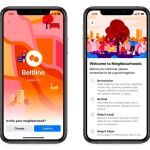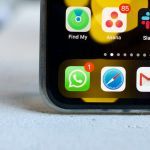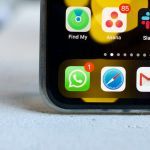Dominique Luchart's Blog, page 633
May 5, 2021
Facebook’s Nextdoor-clone Neighborhoods is coming soon to four US cities, James Vincent


Facebook, which never saw a social network it couldn’t copy, says its Nextdoor-clone Neighborhoods is now available across Canada and is coming soon to four US cities. According to CNET, the US locations being targeted are Charlotte, North Carolina; San Diego, California; Baton Rouge, Louisiana; and Newark, New Jersey.
Like Nextdoor, Neighborhoods is all about corralling geographically-defined groups of users into a single space to discuss local goings-on. Facebook says users should be able to get to know neighbors, ask for recommendations for the best coffee shops or locksmiths, and organize local events. Users can also create splinter groups specific to their interests.
“You can find vibrant local Facebook groups about your area, or…
The post Facebook’s Nextdoor-clone Neighborhoods is coming soon to four US cities, James Vincent appeared first on NEWDAWN Blog.
PS5 designer helps Nike with latest Paul George sneakers,

Nike, Sony, and basketball player Paul George have collaborated on another pair of sneakers, the PG 5, with help from PS5 designer Yujin Morsawa. According to Sony, “the colors of the shoe are heavily inspired by the industrial design of the PS5” with the PlayStation’s signature circle, square, cross, and triangle shapes woven into the materials like a DualSense controller. There’s also a PlayStation logo on the tongue of the right shoe, while the left’s tongue has Paul George’s PG logo.
The release comes a little over two years after Nike and PlayStation’s last sneaker collaboration, the PG 2.5, which drew inspiration from the design of the original PlayStation console. Earlier that year, the two companies worked together on the PG2, which were inspired by the PS4.
 Image: Nike / Sony
Image: Nike / Sony Image: Nike / Sony
Image: Nike / Sony Image: Nike / Sony
Image: Nike / Sony Image: Nike / Sony
Image: Nike / SonyThe PG 5 shoes are going on sale in “select regions” on May 14th, and they’ll arrive in North America on May 27th priced at $120, according to Nike’s site. There’s no word on how many pairs Nike will release, but given how limited its previous run of PlayStation sneakers was, we’re expecting these to sell out fast. Fitting, given how hard it still is to find PS5 consoles in stock.
If you’re interested, Sony says you should keep your eye on the Nike SNKRS app or local Nike website for more information on release dates and availability.
The post PS5 designer helps Nike with latest Paul George sneakers, appeared first on NEWDAWN Blog.
PS5 designer helps Nike with latest Paul George sneakers, Jon Porter

 Image: PlayStation
Image: PlayStationNike, Sony, and basketball player Paul George have collaborated on another pair of sneakers, the PG 5, with help from PS5 designer Yujin Morisawa. According to Sony, “the colors of the shoe are heavily inspired by the industrial design of the PS5” with the PlayStation’s signature circle, square, cross, and triangle shapes woven into the materials like a DualSense controller. There’s also a PlayStation logo on the tongue of the right shoe, while the left’s tongue has Paul George’s PG logo.
The release comes a little over two years after Nike and PlayStation’s last sneaker collaboration, the PG 2.5, which drew inspiration from the design of the original PlayStation console. Earlier that year, the two companies worked together on the PG2,…
The post PS5 designer helps Nike with latest Paul George sneakers, Jon Porter appeared first on NEWDAWN Blog.
May 4, 2021
Epic says there’s an App Store payment lockout — but Apple just sees friction,

One of the Epic v. Apple trial’s big keywords is “cross-wallet play.”
In Epic’s Fortnite, “cross-wallet” means you can buy in-game currency (known as V-Bucks) with real money on one device, then spend it on a different device. The latter platform doesn’t get a cut of your initial, non-virtual financial transaction, which is why Nintendo and Sony don’t support cross-wallet access on the Switch and PlayStation.
Apple did support cross-wallet play before banning Fortnite last year — and on the trial’s second day, that fact became a serious pitfall for Epic. Apple continued a long cross-examination of Epic CEO Tim Sweeney, whose hours of testimony included a digression on whether Fortnite counts as a true metaverse or simply a big free-to-play game that has concerts. (Judge Yvonne Gonzalez Rogers suggested, and Sweeney concurred, that “the most readily acceptable analogy” might be Steven Spielberg’s Ready Player One.)
Sweeney was followed by two witnesses from outside Epic: the founder of an iOS yoga app, followed by the product manager for Nvidia’s cloud gaming service. All argued that Apple’s tightly managed App Store forced customers to use clunky workarounds. Meanwhile, Apple argued that the workarounds weren’t necessarily worse — just different.
Fortnite was kicked off the App Store for adding its own V-Bucks purchasing system right inside the app, violating Apple’s restrictions on in-app payment processing. But as Apple’s lawyers pointed out today, Epic had another option for selling V-Bucks on iOS. The company just needed to sell them directly through its website, which users could visit through the iPhone or iPad Safari browser without Apple getting any kind of commission. When they booted up Fortnite on iOS, their V-Bucks would be waiting.
Judge Yvonne Gonzalez Rogers found this argument compelling enough to follow up on. Why couldn’t iPhone users buy V-Bucks through Safari, she asked, before Fortnite’s ban in August? Epic CEO Tim Sweeney admitted that Epic could have added the feature — but “it wasn’t a very attractive option for our customers,” Sweeney told her. If somebody wants to buy V-Bucks, he said, there’s a good chance they’re already looking at an item in Fortnite. “To set Fortnite aside and pull out some device, browse to a website, log in, make a transaction there, it’s extremely inconvenient.” In short, “there’s a huge amount of payment processing and customer friction associated with selling a user of an app an item outside of that app.”
But after asking how old most Fortnite players were, Rogers suggested that a little friction might be a good thing. “Why is it so inconvenient that someone can’t make what I would call, as a parent, an impulse purchase?” she asked. “Isn’t that a responsible way to deal with a young client base?” If people can buy V-Bucks and then switch platforms, “what you’re really asking for is the ability to have impulse purchases.”
Sweeney said Fortnite had parental controls, but he didn’t dispute Rogers’ basic point. “Yes. Customer convenience is a huge factor in this. People are much more likely to make a purchase if it’s easy to make a purchase,” he said.
A similar question arose with a later witness. Benjamin Simon is the CEO of a company called Yoga Buddhi, which runs an iOS app called Down Dog. (Sadly, nobody in court thought to make an Updog joke.) Yoga Buddhi offers a hefty discount for signing up outside the iOS app. And unlike Epic, it’s fine sending people to a website. Simon claims, however, that Apple makes finding that website as hard as possible.
Simon says that Apple rejected several versions of Down Dog that reference getting a discount elsewhere. Right now, about half the iOS user base apparently pays a premium to sign up through the App Store. For comparison, only 10 percent of Android users pay a similar premium through the Play Store, because Google doesn’t have the same restrictions.
Simon acknowledged that Yoga Buddhi can reach customers via other methods like email and help them switch to the discounted version. The problem, again, is friction. “We’re restricted in our ability to communicate with our customers from within our product,” he complained.
From Apple’s perspective, both executives are making a big deal out of a small inconvenience. Customers might have to work a little harder to save money, but that doesn’t equate to a monopolistic lockdown. And while Sweeney describes Fortnite as a lofty metaverse, Rogers put it in the very different context of “freemium” gaming — an industry whose powerful, frictionless gaming loops are regularly criticized as addictive and predatory.
Arguably, though, that very criticism bolsters Epic’s claims. In the past several years, regulators and researchers have shown increasing concern over subtle design choices in apps — like infinite scrolling, confetti animation, and tweaks to the sorting algorithms on social networks. There’s a broad consensus that small nudges can substantially increase how much people invest in digital platforms. But Epic might have to work harder to convince a court this investment isn’t a bad thing.
The post Epic says there’s an App Store payment lockout — but Apple just sees friction, appeared first on NEWDAWN Blog.
Epic says there’s an App Store payment lockout — but Apple just sees friction, Adi Robertson

 Illustration by Alex Castro / The Verge
Illustration by Alex Castro / The VergeOne of the Epic v. Apple trial’s big keywords is “cross-wallet play.”
In Epic’s Fortnite, “cross-wallet” means you can buy in-game currency (known as V-Bucks) with real money on one device, then spend it on a different device. The latter platform doesn’t get a cut of your initial, non-virtual financial transaction, which is why Nintendo and Sony don’t support cross-wallet access on the Switch and PlayStation.
Apple did support cross-wallet play before banning Fortnite last year — and on the trial’s second day, that fact became a serious pitfall for Epic. Apple continued a long cross-examination of Epic CEO Tim Sweeney, whose hours of testimony included a digression on whether Fortnite counts as a true metaverse or simply a big…
The post Epic says there’s an App Store payment lockout — but Apple just sees friction, Adi Robertson appeared first on NEWDAWN Blog.
WhatsApp payments are finally coming back to Brazil after government suspension,

WhatsApp is again rolling out its payments service in Brazil, after the service was suspended by Brazil’s Central Bank in June of 2020 a few days after it launched there. Facebook CEO Mark Zuckerberg made the announcement in a video aired in Brazil, where he spoke about how the payment information added to WhatsApp will also be able to be used on Facebook and Instagram.
According to David Marcus the head of Facebook Financial, the service returning to Brazil will be part of a “gradual rollout,” but it seems like the company is serious about it returning: it’s already posted a video promoting the service, and has published a page that states the underlying Facebook Pay system has been authorized by the Central Bank (Facebook is WhatsApp’s parent company).
A gente sabe que voces estavam esperando por isso. Pagamentos no WhatsApp comeca hoje a ficar disponivel pelo . Para saber mais: https://t.co/O3l4UJOfXl pic.twitter.com/W2VFRuoWfC
— WhatsApp (@WhatsApp)
When the service originally launched in Brazil, the country’s central bank suspended it, citing concerns about competition in the payment system market. The bank said it planned to evaluate whether the service was compliant with regulations, despite the fact that Facebook said it had been in contact with the authority before the launch.
In late March of this year, it was reported by Reuters that the bank had approved the service, after Facebook had obtained formal approval to run payments. According to a press release, WhatsApp users will be able to connect debit, prepaid or combo cards from several banks that are working with its payment processor.
The post WhatsApp payments are finally coming back to Brazil after government suspension, appeared first on NEWDAWN Blog.
WhatsApp payments are finally coming back to Brazil after government suspension, Mitchell Clark

 Photo by Thomas Ricker / The Verge
Photo by Thomas Ricker / The VergeWhatsApp is again rolling out its payments service in Brazil, after the service was suspended by Brazil’s Central Bank in June of 2020 a few days after it launched there. Facebook CEO Mark Zuckerberg made the announcement in a video aired in Brazil, where he spoke about how the payment information added to WhatsApp will also be able to be used on Facebook and Instagram.
According to David Marcus the head of Facebook Financial, the service returning to Brazil will be part of a “gradual rollout,” but it seems like the company is serious about it returning: it’s already posted a video promoting the service, and has published a page that states the underlying Facebook Pay system has been authorized by the Central Bank (Facebook is…
The post WhatsApp payments are finally coming back to Brazil after government suspension, Mitchell Clark appeared first on NEWDAWN Blog.
‘2 Funny Astronauts’: NASA vets Mike Massimino and Garrett Reisman launch new podcast, ,

Mike Massimino and Garrett Reisman are quick to clarify the title of their new podcast. The two NASA veterans want their listeners to know they are not two “funny guys.”
“We’re not funny guys, we’re funny astronauts!” the two say, almost in unison.
“We don’t want people thinking we’re boasting that we are funny. We’re not. That’s not what we are saying,” insists Massimino. “We’re funny for astronauts.”
Whatever they are, their banter inspires plenty of laughter in “2 Funny Astronauts,” launching on Wednesday (May 5). The weekly podcast will be available on Spotify, Apple Podcasts and YouTube, with other online services to follow.
Related: NASA astronaut Mike Massimino’s space career in photos
As an astronaut, Massimino flew on two space shuttle missions to service the Hubble Space Telescope. Reisman lived on board the International Space Station and then helped deliver a Russian docking module to the orbiting complex.
Now both of them are college professors — and occasional actors; Massimino appeared as himself on “The Big Bang Theory” and Reisman recently cameoed on Apple TV+’s “For All Mankind.” The two long-time friends never had to chance to fly together, so they wanted to find another way to work with each other.
“Back when we were in the Astronaut Office together, we were regularly cracking each other up,” Reisman recalled in an interview with collectSPACE.com. “After we left NASA, we both did some stuff in the public domain and for a long time we kept saying that it would be great if we did something together.”
[image error]
Mike Massimino, as seen in 2002 on a spacewalk outside of space shuttle Columbia to service the Hubble Space Telescope. (Image credit: NASA)The two (funny) astronauts thought about tapping into their experiences on screen and met with production companies about starting a reality TV show, but ultimately decided on creating the podcast.
“We said why don’t we just do a podcast, because even we could figure that out, right?” said Reisman.
“I wasn’t so sure about that,” Massimino interjected.
“You know, we’re not good with technology,” said Reisman, who, like Massimino, has a doctorate in mechanical engineering. “We had to do the best we could.”
As it turned out, “2 Funny Astronauts” did need some tech to make it possible. Although both hosts originally hailed from the tri-state area (as their New Jersey and Long Island accents still attest), Reisman now works in Los Angeles, while Massimino is in New York City.
“We can’t be together in the same room, which is unfortunate for this, but through technology — we have a really good producer — we are able to tie in together,” said Massimino. “The only issue is sometimes we have to get Garrett up a little earlier than expected. Other than that, it seems to have worked out pretty good so far.”
Related: Astronaut Garrett Reisman talks about the ups and downs of space
[image error]
Garrett Reisman, as seen in 2010 taking advantage of the zero-g environment on the middeck of the space shuttle Atlantis. (Image credit: NASA)Each episode of “2 Funny Astronauts” features Massimino and Reisman riffing off each other on the subjects they like to discuss, though the two try to stay close to the topic of space exploration.
This is not your typical “how to be an astronaut” NASA lecture, though.
“What we’re really going to try to do is demystify what it is like to be an astronaut,” Massimino told collectSPACE. “A lot of times the perception is we’re very stuffy and very by the book. We just want to show people what is like to hang out with astronauts, how fun it can be to be an astronaut and some of the shenanigans that have occurred.”
The podcast won’t’ be raunchy, said Reisman, but it won’t be G-rated either.
“We talked about this, about what we are shooting for, and we agreed on PG-13. So we might occasionally say a bad word, but nothing so bad I’d be embarrassed talking about it in front of my kids,” said Reisman.
“But that’s the idea, to tell the story of being an astronaut in a relatable way, in a realistic way and obviously a funny way,” he said.
Of course, it will be up to the listeners to judge if Massimino and Reisman are only funny for being astronauts, or all around funny guys.
“If it was a good idea, it was all my idea. If it’s a bad idea, it was Garrett’s. So why don’t we wait on that,” said Massimino, with a laugh.
Follow collectSPACE.com on Facebook and on Twitter at @ collectSPACE . Copyright 2021 collectSPACE.com. All rights reserved.
The post ‘2 Funny Astronauts’: NASA vets Mike Massimino and Garrett Reisman launch new podcast, , appeared first on NEWDAWN Blog.
Boost Mobile’s Unlimited Plus plan now comes with talk, text, and telemedicine, Ian Carlos Campbell

 Image: Boost Mobile
Image: Boost MobileIn what looks to be a first in terms of subscriber perks, Boost Mobile has announced that its $60 per month Unlimited Plus cellphone plan will come with access to to 24/7 telemedicine through K Health starting this summer.
Specifically, Unlimited Plus subscribers will get all of the features of K Health’s usual $9-per-month offering. That includes the ability to text chat or hop on a video call with a doctor through the K Health app, which uses the app’s AI suggestions to identify symptoms and potential ailments, and receive actual treatment, including medications and other prescriptions.
The service is free and available for all Boost Unlimited Plus subscribers and offered at a discounted price of $7.99 per month for all of Boost…
The post Boost Mobile’s Unlimited Plus plan now comes with talk, text, and telemedicine, Ian Carlos Campbell appeared first on NEWDAWN Blog.
Apple exec suggested cutting App Store commission to 20 percent as early as 2011,

Phil Schiller, the Apple executive in charge of the App Store, raised the possibility of the company cutting its 30 percent commission rate to 25 or even 20 percent back in 2011 in response to competition. Schiller floated the idea in an email to then Apple CEO Steve Jobs and head of Apple services Eddy Cue. The email has been made public as part of the company’s legal battle with Epic Games. Bloomberg was first to report on the email exchange.
“Do we think our 70/30 split will last forever?” Schiller’s email begins. “I think someday we will see enough challenge from another platform or web based solutions to want to adjust our model.” Schiller goes on to suggest that if Apple were to ever change its fee structure, that it should do so “from a position of strength rather than weakness” and floats the idea of Apple dropping its commission rate once the App Store is generating over $1 billion in annual profit.
 The email, released as part of Epic’s lawsuit against Apple.Image: Court Documents
The email, released as part of Epic’s lawsuit against Apple.Image: Court Documents“I know that this is controversial, I just tee it up as another way to look at the size of the business, what we want to achieve, and how we stay competitive,” Schiller wrote. “Just food for thought.” Attached to the email is a Wall Street Journal article from 2011 which discussed the possibility of developers using web apps to bypass Apple’s App Store fees.
Apple’s 30 percent commission on many in-app purchases is central to its legal battle with Epic Games, which has accused the App Store tied to iPhones and iPads of being a monopoly. Epic is required to use Apple’s payment method for in-app purchases within Fortnite (and hence pay a 30 percent commission), and it was the company’s switch to offering its own in-app payments system that caused Apple to kick the game out of the App Store.
In response to the email, Apple said there is no evidence that the App Store’s fees are tied to its profit, and that the 2011 email did not confirm the store made $1 billion in profit, Bloomberg reports. Analysis from Sensor Tower has the App Store’s 2020 commissions revenue at around $22 billion, and Epic cites one witness who claims that its profit rate sits at around 80 percent.
Apple has adjusted its commission structure over the years, but has never dropped it standard rate wholesale to 25 or 20 percent. In 2016 it dropped its commission to 15 percent for subscribers who have signed up to a service for over a year. Then, last year, it dropped its rate to 15 percent for any developers who make under $1 million in sales on its store. The move saw pushback from Apple’s critics, with Epic CEO Tim Sweeney calling the decision “a calculated move by Apple to divide app creators and preserve their monopoly on stores and payments, again breaking the promise of treating all developers equally.”
The post Apple exec suggested cutting App Store commission to 20 percent as early as 2011, appeared first on NEWDAWN Blog.



